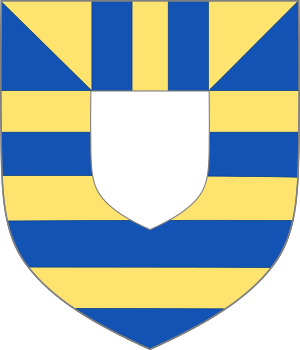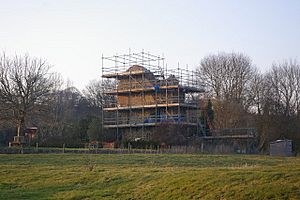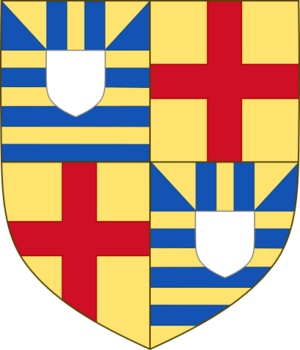Roger Mortimer, 4th Earl of March facts for kids
Quick facts for kids Roger Mortimer |
|
|---|---|
| Earl of March Earl of Ulster |
|
 |
|
| Arms of Mortimer: Barry of six or and azure, on a chief of the first two pallets between two gyrons of the second over all an inescutcheon argent | |
| Spouse(s) | Alianore Holland, Countess of March |
| Issue | |
| Anne Mortimer Edmund Mortimer, 5th Earl of March Roger Mortimer Eleanor Mortimer |
|
| Noble family | Mortimer |
| Father | Edmund Mortimer, 3rd Earl of March |
| Mother | Philippa, 5th Countess of Ulster |
| Born | 11 April 1374 Usk, Monmouthshire |
| Died | 20 July 1398 (aged 24) County Carlow, Ireland |
Roger de Mortimer, 4th Earl of March, 6th Earl of Ulster (born April 11, 1374 – died July 20, 1398) was an important English nobleman. He was seen as the next in line to become king after King Richard II. This was because his mother was King Richard II's first cousin.
Roger Mortimer's father, the 3rd Earl of March, passed away in 1381. This meant that six-year-old Roger became the new Earl. His care and marriage were arranged by Thomas Holland, 2nd Earl of Kent. Roger married Thomas Holland's daughter, Alianore. Roger spent a lot of his life in Ireland. He served as the Lord Lieutenant of Ireland several times. He died during a battle in Kellistown, County Carlow. His young son, Edmund Mortimer, 5th Earl of March, took over his titles.
Contents
Roger Mortimer's Early Life
Roger Mortimer was born on April 11, 1374, in Usk, Monmouthshire. He was the oldest son of Edmund Mortimer, 3rd Earl of March. His mother was Philippa of Clarence. Philippa was the daughter of Lionel of Antwerp, 1st Duke of Clarence. Lionel was the second son of King Edward III.
Roger's mother, Philippa, had a very strong claim to the English throne. This claim then passed on to her children. Roger had a younger brother named Edmund. He also had two sisters. One sister, Elizabeth, married Henry 'Hotspur' Percy. His other sister, Philippa, married three times. Her husbands were John Hastings, 3rd Earl of Pembroke, Richard de Arundel, and Sir Thomas Poynings.
Who Looked After Roger?
When Roger was young, he was a very important heir. This meant that who looked after him was a big political issue. On December 16, 1383, Roger's lands in England and Wales were given to a group of powerful nobles. They paid £4000 each year to manage his estates.
At first, Earl of Arundel was in charge of Roger himself. But in August 1384, King Richard II's mother, Joan of Kent, stepped in. She arranged for Roger's care and marriage to be given to her son, Thomas Holland, 2nd Earl of Kent. Thomas Holland was King Richard's half-brother.
Around October 7, 1388, when Roger was 14, he married Thomas Holland's daughter, Eleanor Holland. Eleanor was 18 at the time. She was also King Richard II's half-niece. Roger officially took control of his lands in Ireland on June 18, 1393. He then took control of his lands in England and Wales on February 25, 1394.
King Richard II had no children. This made Roger Mortimer the next in line to the throne. He was a direct descendant of King Edward III. Some people believed King Richard publicly named Roger as his heir in 1385. However, historical records show that this story might not be true. Still, people at the time openly talked about Roger's claim to the throne. King Richard II made Roger a Knight Bachelor on April 23, 1390.
Roger Mortimer's Time in Ireland
After Roger became an adult, he spent most of his time in Ireland. King Richard had first made Roger his Lord Lieutenant of Ireland on January 24, 1382. Roger was only seven years old then, so his uncle, Sir Thomas Mortimer, acted as his deputy.
King Richard reappointed Roger Mortimer as his lieutenant in Ireland on July 23, 1392. He was reappointed again in September 1394. Even though he was the king's representative, he found it hard to control the local Irish leaders. On April 25, 1396, the king made him lieutenant in Ulster, Connacht, and Meath. Roger stayed in Ireland for most of the next three years. In April 1397, the king reappointed him for another three years.
Because Roger lived mostly in Ireland, he didn't play a big role in English politics. His closest friends and allies in England were his family. This included his brother, Edmund, to whom he gave land. It also included the Percy family, as his older sister Elizabeth had married into it. His younger sister, Philippa, had married the Earl of Arundel.
Roger's great wealth and royal family connections meant he would eventually get involved in the political troubles of King Richard II's final years. On September 4, 1397, Roger was ordered to arrest his uncle, Sir Thomas Mortimer. His uncle was accused of treason for his actions at the Battle of Radcot Bridge. However, Roger didn't really try to arrest him.
Things became even more suspicious in January 1398. Roger was called to a meeting of Parliament in Shrewsbury. He was greeted with great excitement by a huge crowd of supporters. These supporters wore his family's colors. These events made the king suspicious. After Roger returned to Ireland in January 1398, the king ordered Roger's enemy, the Duke of Surrey, to follow and capture him. The Duke of Surrey was Roger's brother-in-law.
Roger Mortimer's Death

On July 20, 1398, Roger Mortimer was killed in a small fight. He was only 24 years old. This happened either in Kells, County Meath, or Kellistown, County Carlow. A historical record says he was riding ahead of his army, alone and wearing Irish clothes. It's possible this was against the law. The people who killed him didn't know who he was. Roger was buried at Wigmore Abbey. The next year, King Richard II went to Ireland to get revenge for Roger's death.
Roger's young son, Edmund, took over his titles and his claim to the throne.
Roger Mortimer's Family
Roger Mortimer and his wife, Alianore Holland, had two sons and two daughters:
- Anne Mortimer (1388–1411). She was born when her father was 14. Anne married Richard of Conisburgh, 3rd Earl of Cambridge (1385–1415). Richard was from the House of York. Anne's grandsons later became King Edward IV and King Richard III.
- Edmund Mortimer, 5th Earl of March (1391–1425).
- Roger Mortimer (born April 23, 1393 – died around 1413).
- Eleanor Mortimer (born 1395–1422). She married Sir Edward de Courtenay (died 1418) and had no children. She later married John Harpeden.
In June 1399, Roger Mortimer's widow, Alianor, married Edward Charleton, 5th Baron Cherleton. They had two daughters:
- Joan. She married John Grey, 1st Earl of Tankerville. Joan was one of the heirs to her half-brother, Edmund Mortimer, 5th Earl of March, in 1425.
- Joyce. She married John Tiptoft, 1st Baron Tiptoft.
Alianor passed away on October 6 or 18, 1405.
Roger Mortimer's Family Tree
 | DeHart Hubbard |
 | Wilma Rudolph |
 | Jesse Owens |
 | Jackie Joyner-Kersee |
 | Major Taylor |


